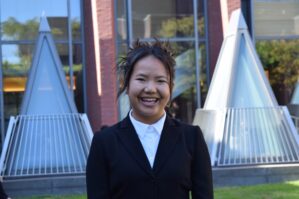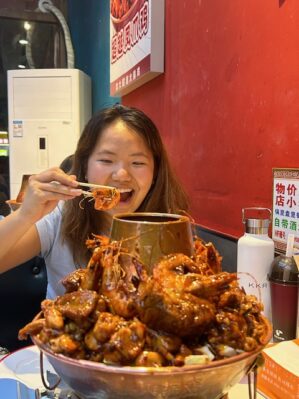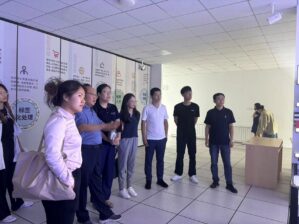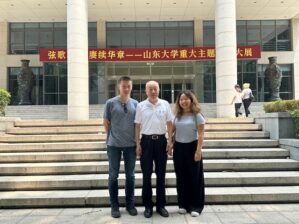 I had one of the most rewarding summers conducting field research and experiencing the daily life of a Chinese local. Through Wharton’s World Research Assistantship Program, I got the opportunity to travel to Shandong, China, and study cross-border e-commerce in one of the leading pilot free trade zones in China. I was supported by my faculty advisor, Professor Xu (Henry) Han, and worked with Professor Wu Changqi of Peking University and Shandong University and Dr. Lu Tianchi, research director at the Weifang Cross-Border E-Commerce Research Institute.
I had one of the most rewarding summers conducting field research and experiencing the daily life of a Chinese local. Through Wharton’s World Research Assistantship Program, I got the opportunity to travel to Shandong, China, and study cross-border e-commerce in one of the leading pilot free trade zones in China. I was supported by my faculty advisor, Professor Xu (Henry) Han, and worked with Professor Wu Changqi of Peking University and Shandong University and Dr. Lu Tianchi, research director at the Weifang Cross-Border E-Commerce Research Institute.

Despite being fascinated by China as one of the fastest-growing economies with complex cultural traditions, I’ve only previously had the opportunity to visit the country as a tourist. Therefore, rather than choosing to live in a major city like Beijing or Shanghai, I decided to spend my summer in Weifang, a medium-sized industrial city, to learn about the manufacturing backbone supporting China’s larger cities. Through WRAP, I got the opportunity to experience China truly, speaking only Chinese despite my intermediate Chinese level, and engaging with Chinese culture both within my research and outside.

At the research institute, we investigated how the Weifang pilot comprehensive bonded zone policies promoted the growth of industries with the cross-border e-commerce ecosystem. Given the meteoric rise of online shopping during the pandemic, our research was especially relevant to local enterprises adapting to the rapidly evolving industry. We worked on building the Weifang Industry Development Report, which serves to provide an overview of cross-border e-commerce development and present data analysis and recommendations for areas of growth.
My role working on the industry report involved conducting a literature review, compiling statistics, contributing to local enterprises investigations, and writing a case study. Looking through journals, databases, and surveys, I compiled over a hundred pages of statistics and resources to analyze within the industry report. During local enterprise investigations, I prepared questions and engaged in the interview. I wrote a case study after one visit to Xiaobei Cloud Warehouse, conducting a follow-up interview and doing further research to explore the use of big data supply chain logistic service providers.
In addition to my research, it was also gratifying to experience everyday life in China and make some lifelong connections with fellow researchers and locals. The food I ate every day was incredible, both in taste and aesthetics, and is something I already miss. Every day I tried a new flavor, like eating durian from a nearby fruit stand and drinking yogurt from a straw to wash it down, to munching on sticky pork belly with my suitemates while having shaokao (Chinese barbecue). I also loved exploring nearby recreational activities. I took advantage of the free public bikes in Weifang, going on long bike rides along nearby rivers, and stopping to join the square dancers I see along the way.

Making friends in Chinese was daunting. I have a heavy American accent and sometimes the subtleties of Mandarin flew over my head, but people were very open with sharing their culture and interests. My conversation with people was eye-opening, and I loved exchanging perspectives on everything from our upbringing to the Olympics.
WRAP has provided me the opportunity to fully experience China, and this summer is one I will cherish. Every moment was an opportunity to learn, from interviewing the CEO of a local enterprise to chatting with a local about their life. I’ve grown so much through this unique opportunity, and I strongly recommend WRAP to anyone interested in researching and exploring a new culture.


